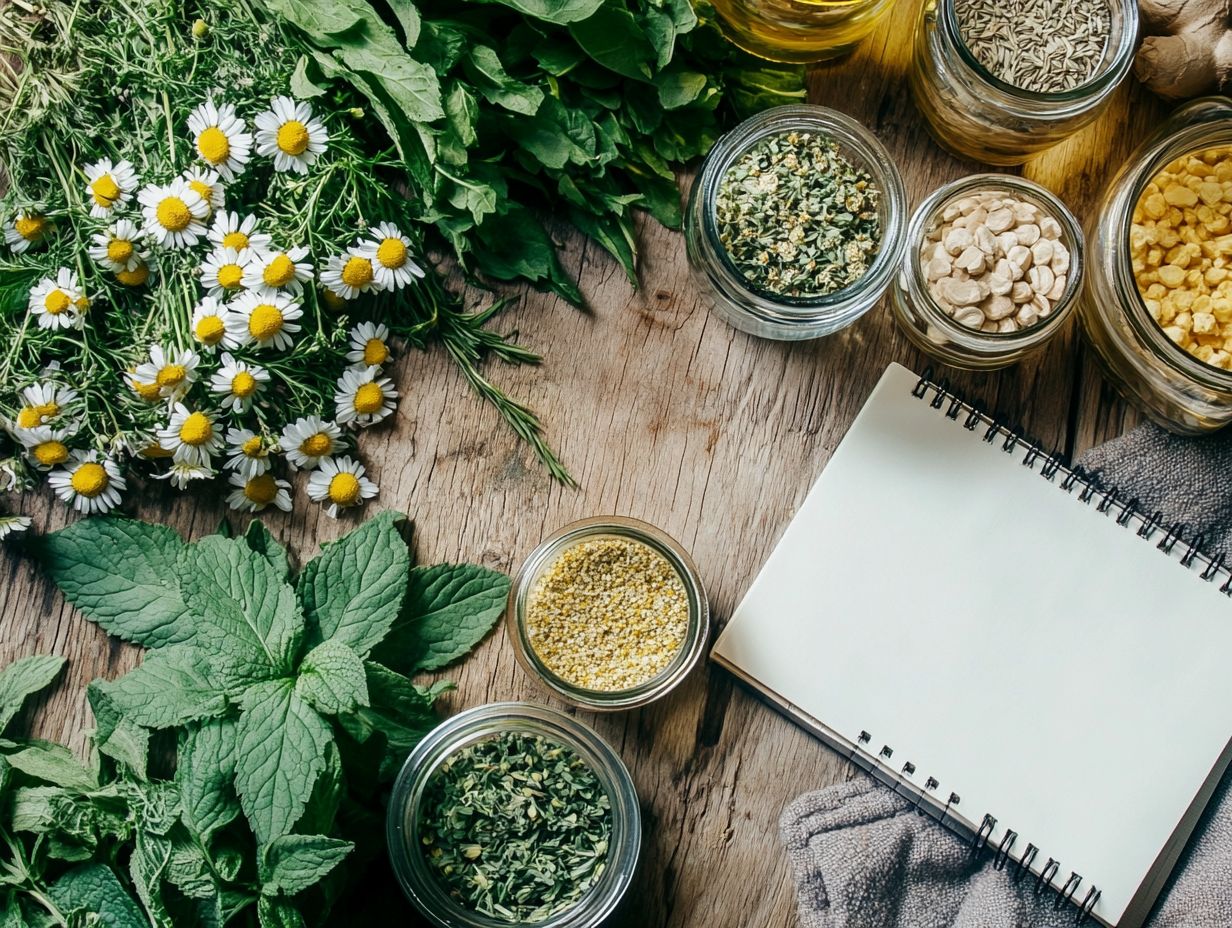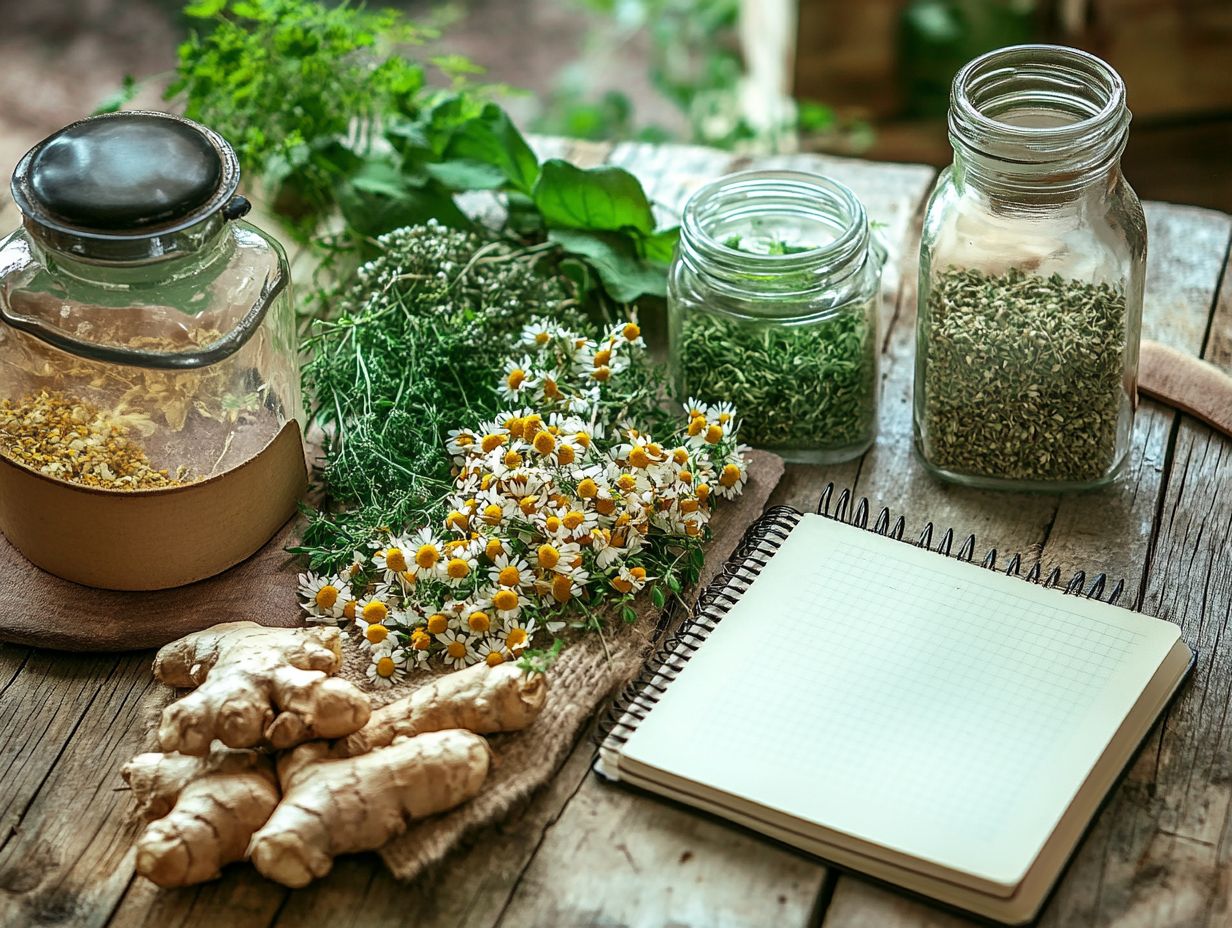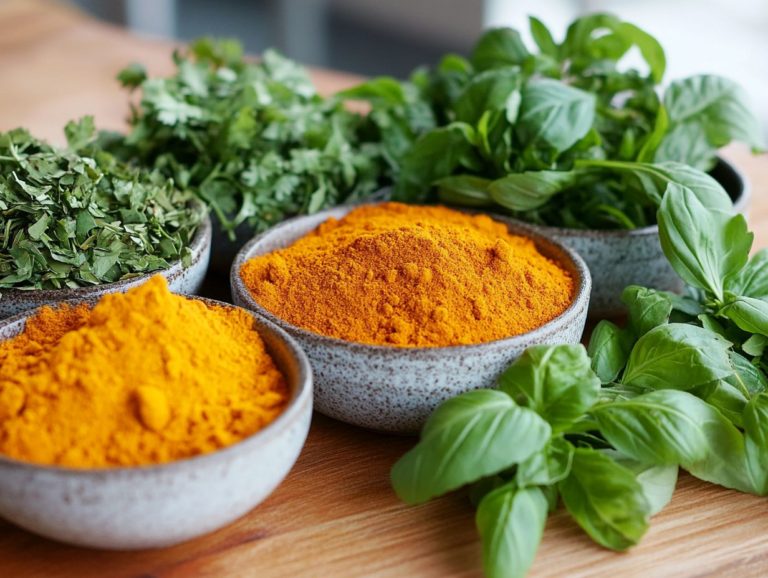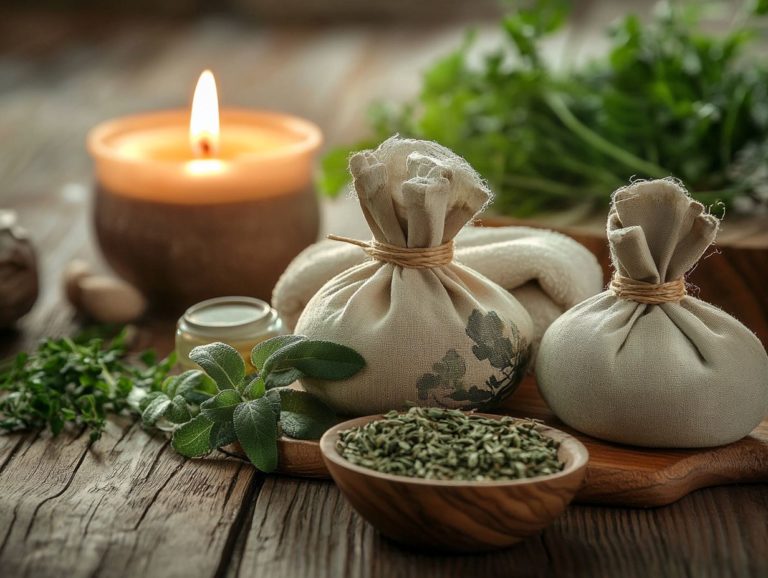Are There Side Effects of Herbal Remedies?
Herbal remedies have become increasingly popular as natural alternatives for a range of health concerns! Discover how these remedies can change your wellness journey, yet their use is not without its risks.
This article delves into what herbal remedies actually are, sheds light on potential side effects, and examines how they might interact with prescription medications. You ll learn to recognize the symptoms of adverse effects and understand the importance of sourcing high-quality products.
We will also discuss alternatives to herbal treatments, offering you a well-rounded perspective that empowers you to make informed decisions on your wellness journey.
Contents
Key Takeaways:

Keep in mind that herbal remedies can have side effects. Recognizing these symptoms is crucial for your health!
When using herbal remedies, it is essential to choose reputable sources and consider alternative natural remedies.
Understanding Herbal Remedies
Herbal remedies, often known as herbal medicines, are natural treatments derived from various parts of plants. They have been embraced for centuries across cultures due to their potential health benefits. Herbal remedies come in many forms. These include teas, tinctures, and supplements, harnessing the active ingredients found in plants such as Ginkgo biloba, St. John’s wort, and Ginseng to address a range of health concerns.
Unlike conventional medicines, herbal options are often favored for their considering the whole person approach to well-being, making them an attractive alternative for those in search of natural solutions. However, it’s essential for you to understand how herbal remedies work and their effectiveness and safety. Being informed is crucial, as these treatments can also carry possible harmful side effects.
Potential Side Effects of Herbal Remedies
While herbal remedies may be seen as safe alternatives to conventional medicines, it s essential to recognize that they can come with possible harmful side effects that you need to be aware of. This highlights the importance of carefully checking for safety.
Even natural products like Kava or Ephedra can lead to adverse effects or interact negatively with prescribed medications, which could pose serious health risks.
Being informed about the real dangers associated with these herbal products is vital, and understanding how to use them responsibly is key to navigating their benefits safely.
Common Side Effects
Common side effects of herbal medicines can vary from mild discomfort to serious adverse effects, underscoring the necessity of grasping the safety concerns associated with their use. For instance, you might find that St. John’s wort could make you more sensitive to sunlight, while Ginseng might lead to insomnia or headaches.
It’s crucial for you to be aware of these potential issues so you can make informed choices about herbal remedies. Stay informed and proactive about your health!
Kava, known for its calming effects, has raised concerns due to its association with serious liver damage, putting its safety profile into question. Similarly, Ginkgo biloba, often touted for enhancing cognitive function, can increase the risk of excessive bleeding, particularly for those on anticoagulant medications.
Regularly consuming herbal supplements may also result in unexpected interactions with pharmaceuticals, emphasizing why thorough research is essential before use.
By understanding these specific adverse effects, you can empower yourself to make safer choices and foster informed discussions with healthcare providers about appropriate herbal options.
Interactions with Medications

Interactions with medications are a significant concern when using herbal products. These interactions can alter the effectiveness of conventional medicines and lead to possible risks. For instance, Ginkgo biloba may interact with blood thinners, increasing your risk of bleeding.
Understanding these interactions is essential if you’re considering adding herbal remedies to your health regimen. The herb St. John s Wort may reduce the effectiveness of certain antidepressants and birth control pills. The herb Echinacea may also influence how your body processes drugs that are metabolized by the liver, potentially leading to increased toxicity.
Given these complexities, it s crucial to consult healthcare professionals who can provide informed guidance and monitor any adverse effects. Regular check-ins can help ensure that your use of herbal products complements your prescribed medications, promoting your overall safety and well-being.
How to Identify and Address Side Effects
Recognizing the symptoms of side effects is essential for anyone using herbal medicines. Early identification allows you to act quickly, significantly reducing the risk of serious adverse effects.
Symptoms can vary widely based on the specific remedy and your individual health conditions. For example, some may experience mild nausea from Kava, while others might face more severe reactions from Ephedra.
Understanding how to seek help promptly can make a substantial difference in ensuring your safety.
Recognizing Symptoms and Seeking Help
Recognizing the signs of adverse effects from herbal remedies is crucial for your safety and well-being, as it empowers you to take necessary actions when needed. For instance, if you feel dizzy after taking Ginkgo biloba or experience digestive issues from St. John’s wort, monitor your reactions closely and seek assistance if symptoms arise.
Being aware of potential side effects like allergic reactions or interactions with other medications is absolutely essential. Consider maintaining a health journal to track changes you notice, recording specific remedies, dosages, and any unusual symptoms you encounter.
Consulting with healthcare professionals can offer valuable insights and guidance, ensuring that your use of herbal remedies harmonizes with any pre-existing conditions or treatments. Regular check-ins can help you navigate the complexities of herbal medicine safely, fostering a more informed and cautious approach to your health journey.
Safety Considerations for Using Herbal Remedies
When contemplating the use of herbal remedies, place safety concerns at the forefront of your decision-making. It’s essential to choose reputable sources and adhere to quality standards for herbal products.
Understanding the significance of herbal registration such as that established by the U.S. Food and Drug Administration (FDA) and the MHRA in Europe ensures that the products you select meet crucial safety and efficacy guidelines.
By prioritizing safety and quality, you can confidently navigate the world of herbal medicines, making informed choices that support your well-being.
Choosing Reputable Sources and Products

Choosing reputable sources and products is crucial for ensuring the safety and effectiveness of herbal remedies. Not all herbal products adhere to quality standards. Look for certifications from recognized organizations and verify that the products comply with safety regulations, especially when shopping at health shops, pharmacies, or supermarkets.
To guarantee that the herbal remedies you choose are of high quality, research where the herbs come from. This often reflects the suppliers’ commitment to quality. Check for third-party testing results to get unbiased confirmation of a product’s potency and purity. Reading customer reviews and seeking recommendations from knowledgeable healthcare professionals can enhance your decision-making process.
Understanding the origins of the herbs such as whether they are sustainably harvested and processed without harmful chemicals further aids in selecting safe and beneficial options. By taking these steps, you can confidently navigate the market and invest in herbal products that genuinely support your wellness goals. Act now to ensure you’re making the best choices for your health!
Alternatives to Herbal Remedies
Exploring alternatives to herbal remedies opens a world of options for addressing health challenges, from conventional medicines to a variety of natural solutions.
If you find certain herbal products difficult to tolerate or have concerns about potential side effects, consider dietary supplements or other alternative therapies. Assess all available choices thoughtfully to find the most suitable solution tailored to your unique health needs.
Exploring Other Natural Remedies
Exploring other natural remedies can complement or even serve as alternatives to traditional herbal medicines. Consider options like acupuncture, aromatherapy, and specific dietary supplements, which can offer numerous benefits without the side effects often tied to herbal products.
Each method has unique advantages. For instance, acupuncture effectively manages pain and reduces stress through targeted stimulation of specific points on the body. Aromatherapy employs essential oils to elevate both emotional and physical well-being, crafting a soothing atmosphere that nurtures relaxation and alleviates anxiety.
Dietary supplements serve to support overall health by filling nutritional gaps and potentially easing specific conditions. By incorporating these remedies into your daily routine, you empower yourself to take charge of your health holistically, paving the way for a more balanced and fulfilling lifestyle.
Frequently Asked Questions
Are There Side Effects of Herbal Remedies?

Yes, like any other medication, herbal remedies can have potential side effects that vary from person to person.
Are Herbal Remedies Safe to Use?
When used correctly and in the proper dosage, herbal remedies can be safe. However, it is important to consult with a healthcare professional before starting any herbal remedy.
Do Herbal Remedies Interact with Other Medications?
Yes, herbal remedies can interact with prescription and over-the-counter medications. It is important to inform your healthcare provider of any herbal remedies you are taking to avoid potential interactions.
What Are Some Common Side Effects of Herbal Remedies?
Nausea, vomiting, diarrhea, and allergic reactions are common side effects. However, it is important to note that not everyone will experience these side effects.
Can Herbal Remedies Cause Long-Term Side Effects?
Some herbal remedies may have potential long-term side effects if used for extended periods. It is important to follow the recommended dosage and consult with a healthcare professional if you experience any concerning symptoms.
Are there herbal remedies that can cause serious side effects?
Yes, some herbal remedies can lead to serious side effects, like liver damage or a higher risk of bleeding.
Always research carefully and talk to a healthcare professional before trying any herbal remedy.






